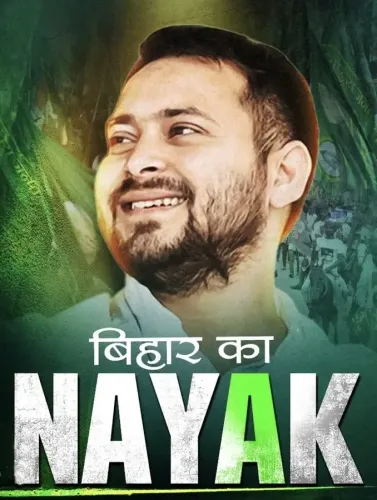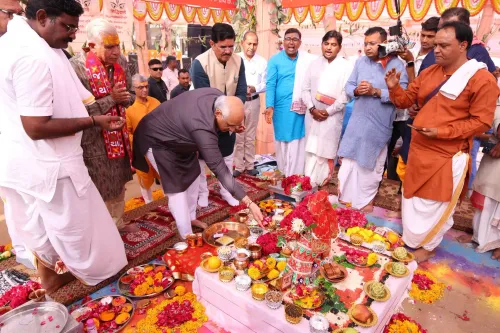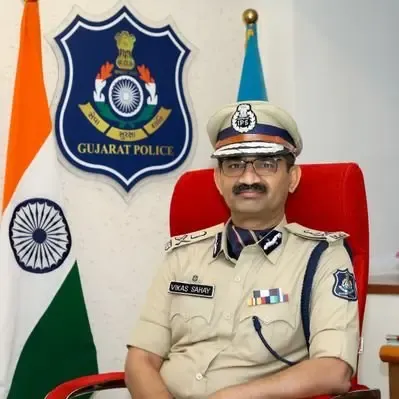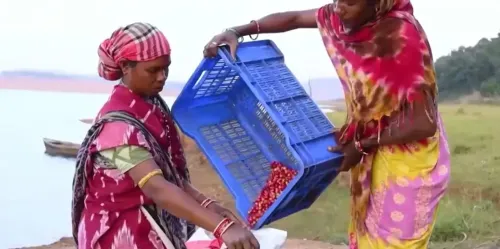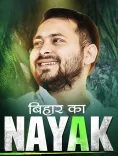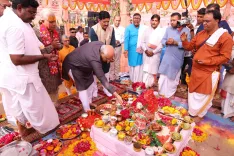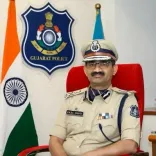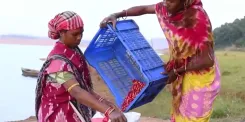Can Europe Be Flexible in Combating Terrorism? Insights from Denmark's Former Ambassador on India's Position
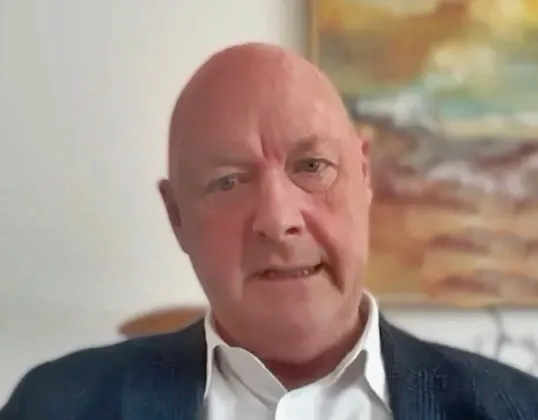
Synopsis
Key Takeaways
- Denmark supports India's counter-terrorism efforts.
- Operation Sindoor aims for global collaboration.
- Pakistan should be reinstated on the FATF grey list.
- PM Modi's leadership has strengthened India's global image.
- The Green Strategic Partnership is crucial for sustainable development.
Copenhagen/New Delhi, June 1 (NationPress) Denmark, which is set to take over the Presidency of the Council of the European Union this year, remains steadfast in its support for India's Operation Sindoor and New Delhi's appeal for a comprehensive global initiative to tackle the peril of terrorism.
In an exclusive interview with IANS, Freddy Svane, the former Danish Ambassador to India, emphasized that there can be no room for flexibility on the European front regarding counter-terrorism efforts.
Praising India's Operation Sindoor diplomatic outreach, the experienced diplomat also endorsed calls to reinstate Pakistan on the Financial Action Task Force's (FATF) grey list.
Excerpts:
IANS: India is delivering a powerful global message against terrorism with its all-party delegations visiting various nations, including a recent trip to Copenhagen. How do you perceive this initiative?
Freddy Svane: It is crucial that the message being conveyed receives attention and prompts action. As someone who served as Ambassador to India for over a decade, I am pleased to see India, in light of the tragic and horrific Pahalgam incident, standing up and speaking out against terrorism. We must transition from words to tangible actions. Therefore, Prime Minister Narendra Modi's decision to send a delegation of parliamentarians globally to advocate for a united front against terrorism is immensely significant and has been well-received here in Denmark.
IANS: Has Operation Sindoor strengthened India's position as a nation?
Freddy Svane: Absolutely. I inquired with some visiting Indian parliamentarians whether this was a new approach, as I have never witnessed India sending all-party delegations worldwide to express its concerns about terrorism and its consequences. I was informed that similar initiatives occurred decades ago. However, India's current assertiveness on this issue is crucial. It establishes India as a nation willing to confront terrorism, marking a new standard. No one should doubt the consequences of failing to curb terrorism. We must work collaboratively as a global family.
IANS: Pakistan, on the other hand, appears to be unrepentant and continues to export terrorism to India...
Freddy Svane: Having lived in India for ten years, I have felt the impact of terrorism firsthand. It is widely acknowledged that Pakistan is involved in these acts. While there are political and military factions within Pakistan, there is only one face when it comes to terrorism, and it is undeniably ugly. Pakistan has instigated numerous terror attacks against India. The current climate calls for a conscious, united response to terrorism, including calling out Pakistan.
IANS: Is it not time to place Pakistan back on the FATF grey list?
Freddy Svane: I believe so. Terrorism does not arise spontaneously; it requires funding and organization. A concerted effort is necessary to prevent financing that fuels terrorism, and it must be halted. Pakistan must be held accountable and placed on that list again without question.
IANS: You first met Prime Minister Narendra Modi when he was Chief Minister of Gujarat. How have you seen India's growth under his leadership?
Freddy Svane: Indeed. I have witnessed India's remarkable growth and have a profound passion for the country. I was the first European Ambassador to meet the now-honorable Prime Minister back in May 2011 in Gujarat, where we had a substantial discussion. Our relationship has flourished over the years, including the development of the Green Strategic Partnership during my second tenure as Ambassador in 2019. India has become more outward-looking and is working towards defining its own trajectory as 'Viksit Bharat.' I firmly believe in 'Viksit Bharat,' emphasizing the need for collaboration, which Denmark and India have achieved successfully. Under Prime Minister Modi, India has grown significantly and will continue to do so.
IANS: PM Modi has solidified his position as a strong global leader over the years, especially during Operation Sindoor...
Freddy Svane: Yes, he has. In my discussions with the visiting parliamentary delegation, I highlighted how India ascended as a global power during its G20 presidency by advocating for the Global South and inviting the African Union into the G20. This aligns with Prime Minister Modi's vision for India to play a significant role in making the world a better, greener, and sustainable place. His decisive actions during Operation Sindoor have delineated new boundaries, establishing a new norm. There should be no doubt that India is prepared to act when necessary, thanks to Prime Minister Modi.
IANS: Has Operation Sindoor enhanced PM Modi's image and contributed to his government's achievements over the past eleven years?
Freddy Svane: Certainly. The fact that all-party delegations have been dispatched globally to discuss Operation Sindoor and the atrocities is evidence of this. It is time to confront terrorism and acknowledge how Pakistan has historically instigated terror attacks. India has demonstrated its growth as a vital global player capable of taking decisive action. A strong leader like Prime Minister Modi is essential for this direction, reinforcing his role as the true defender of India. His popularity is rising internationally, and there will no longer be any doubt about who leads the most populous nation on Earth and the fourth-largest economy in the world. Prime Minister Modi is increasingly recognized as a significant and strategic leader, which is crucial for all of us. A robust India and a strong Prime Minister are what we need, and we have achieved this, albeit against the tragic backdrop of the recent Pahalgam incident. In challenging times, we require someone who can translate words into actions, and that has occurred, which is commendable.
IANS: Do you believe European countries are aligned in their approach to countering state-sponsored terrorism?
Freddy Svane: This is a complex issue. Currently, given recent events in India and the inhumane acts committed, there is no room for flexibility in Europe regarding the fight against terrorism. Terrorism is a global threat that necessitates a unified response, utilizing all available tools. I hope the visits by Indian parliamentary groups foster a collective understanding and awareness that we must transition from rhetoric to action. I will closely monitor the outcomes of these visits to determine if they lead to coordinated efforts against terrorism or merely more empty words. The responsibility lies heavily on India to propose actionable solutions and encourage not only European countries but others globally to unite against this menace. Terrorism will persist as long as we remain divided, but we seem to be coming together, thanks to India and Prime Minister Modi.
IANS: With Pakistan's dwindling number of 'all-weather friends,' isn't it time for these nations to realize they are supporting a terrorist state?
Freddy Svane: While I'm not surprised by some countries aligning with Pakistan, it is crucial for us to unite and establish a common stance. Terrorism, regardless of its definition, is not in the interest of any nation or population. Therefore, we must stand together. I hope that diplomatic efforts will encourage more countries to join India in declaring, 'Enough is enough.' It is time to shift from diplomatically framed words to concrete actions. I encourage India and Prime Minister Modi to articulate a clear action plan.
IANS: What was your initial reaction to the extradition of 2008 Mumbai terror attack suspect Tahawwur Rana to India, who was previously prosecuted for supporting a terror attack in Denmark?
Freddy Svane: I felt immense relief. It signifies that justice will ultimately prevail, and those responsible for terrorism will be held accountable. There can be no safe harbor for terrorists. The extradition of Rana to India, after years of advocacy, sends a strong message that one cannot escape justice, regardless of the institutional mechanisms at their disposal. This is a significant milestone!
IANS: Denmark is the only nation with which India has a Green Strategic Partnership. How do you view the future of this bilateral relationship?
Freddy Svane: I foresee limitless potential. It all began in May 2011 with my meeting with the honorable Chief Minister, now Prime Minister Modi, where we discussed collaborative efforts toward greener, sustainable development. This vision has evolved into the Green Strategic Partnership. We have conducted numerous seminars and workshops focused on renewable energy in Gujarat. I see a direct connection between this initiative and our current partnership, which combines India's and Denmark's strengths. I was astounded by the scale of the Adani project in Khavda last year, showcasing the significance of green transition and cooperation for our bilateral relations. If we fail to address the climate crisis, future generations will suffer. Therefore, I was delighted when Prime Minister Modi visited Denmark, allowing us to advance the Green Strategic Partnership, which is crucial. I hope it inspires others, as the fight against terrorism requires global cooperation as well.

